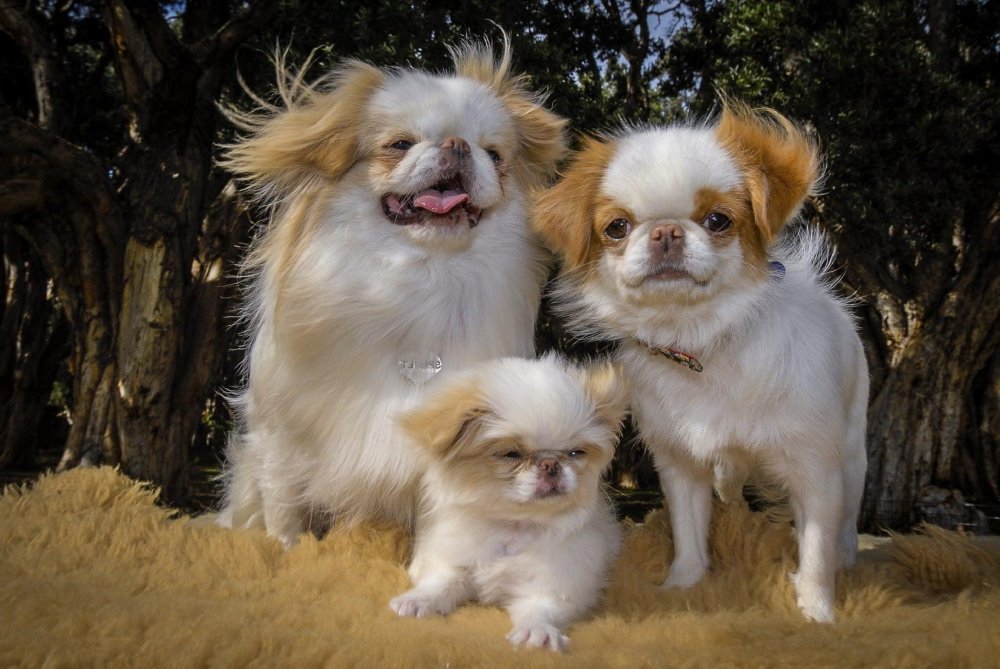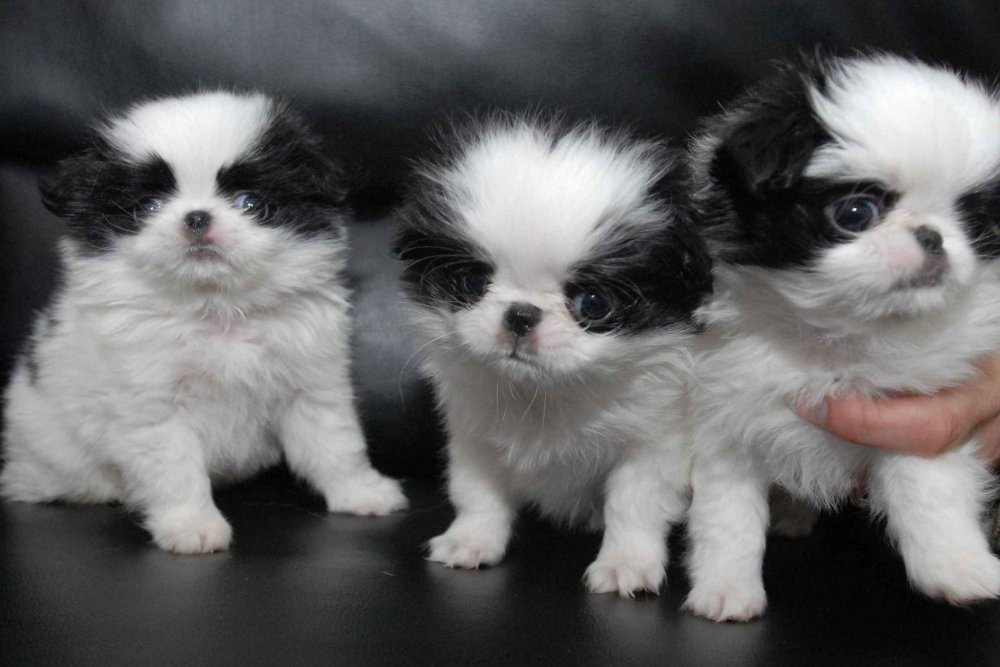- Breed Category: Toy
- Country of Origin: Japan
- Average Height: 20-28 cm (8-11 inches)
- Average Weight: 1.8-4 kg (4-9 pounds)
- Average Life Span: 10-14 years
- Grooming Requirements: Moderate; regular brushing needed
- Exercise Requirements: Low; short daily walks
- Coat Type: Long, silky
- Coat Color Variations: Black & white, red & white
- Shedding Level: Moderate
- Ear Type: Feathered, pendant
- Tail Type: Plumed, carried over back
- Temperament: Affectionate, alert, playful
- Intelligence Level: High
- Barking Tendency: Low
- Compatibility with Children: Good with gentle children
- Compatibility with Other Pets: Generally good
- Training Ease: Moderate; can be stubborn
- Common Health Issues: Heart murmurs, patellar luxation
- Dietary Needs: High-quality small breed diet
- Energy Level: Moderate
- Drooling Tendency: Low
- Sensitivity to Weather: Sensitive to heat
- Overall Maintenance Level: Moderate
- Original Purpose: Companion
- Year of Recognition by Kennel Clubs: 1888
- Apartment Friendly: Yes
- Best Suited For: Singles, seniors, families
- Cost of Ownership: Moderate
- Unique Traits: Cat-like behaviour, elegant appearance
- Cultural Significance: Favoured by Japanese nobility
- Popularity Rank: Moderate
Ever found yourself overwhelmed by the sheer number of dog breeds out there? It’s like trying to pick a favourite chocolate from a box of assorted treats. Each one has its own unique flavour, and the Japanese Chin is no exception. This charming little breed is known for its elegant appearance and delightful personality. In this article, we’ll dive into the world of the Japanese Chin, exploring its fascinating history, distinctive characteristics, and how best to care for one.
The Japanese Chin has a rich history that dates back centuries. Originally bred as a companion for Japanese nobility, these dogs were highly prized for their beauty and grace. Their journey from the palaces of Japan to homes around the world is a tale worth telling.
The Japanese Chin: A Noble Companion

Early Development of the Breed
The Japanese Chin’s origins are shrouded in mystery, but it’s believed they were first developed in China before making their way to Japan. Once in Japan, they were refined into the breed we know today, cherished for their elegance and charm. These dogs were not just pets; they were symbols of status and wealth, often given as gifts among the elite.
Role in Japanese Nobility and Culture
In the courts of Japanese nobility, the Japanese Chin was more than a companion. They were considered living works of art, often depicted in paintings and sculptures. Their presence in the home was a sign of sophistication and refinement, and they were treated with the utmost care and respect.
Key Historical Figures Involved in the Breed’s Introduction to the West
The Japanese Chin’s journey to the West began in the mid-19th century. Commodore Matthew Perry, an American naval officer, is credited with introducing the breed to the United States after receiving them as gifts during his expeditions to Japan. Queen Alexandra of England also played a significant role in popularising the breed in Europe, further cementing their status as a beloved companion.
Physical Characteristics
With their distinctive pushed-in face, large, expressive eyes, and a luxurious coat, the Japanese Chin is a sight to behold. They are small, typically weighing between 2 to 7 kilograms, making them perfect for apartment living. Their coat, often a striking combination of black and white or red and white, requires regular grooming to maintain its beauty.
Appearance and Unique Physical Traits
The Japanese Chin is a small, elegant dog with a distinctive appearance. Weighing between 2 to 7 kilograms, they are perfect for those who prefer a compact companion. Their coat is a luxurious blend of black and white or red and white, creating a striking visual contrast. Regular grooming is essential to keep their coat looking its best.
One of the most unique features of the Japanese Chin is their flat face, which gives them an endearing expression. Their large, expressive eyes seem to convey a world of emotion, making them incredibly engaging. The feathered tail, which gracefully arches over their back, adds to their regal appearance.
Temperament and Behaviour
Japanese Chins are known for their charming and affectionate nature. They thrive on human companionship and are happiest when they are part of the family. Despite their noble history, they are not aloof; instead, they are playful and enjoy a good romp around the house.
These dogs are intelligent and can be quite independent, but they are also eager to please. They adapt well to different living situations, making them ideal for both city and country life. Their gentle temperament makes them great companions for families and individuals alike.
Personality and Suitability as a Family Pet

Typical Personality Traits
The Japanese Chin is a delightful mix of affectionate, intelligent, and playful traits. They love being around people and are known for their charming antics. Their intelligence shines through in their quick learning and adaptability, making them a joy to train. Despite their noble lineage, they have a playful side that can bring a smile to anyone’s face.
Suitability as a Family Pet
These little dogs are perfect for families. Their gentle nature and love for human interaction make them excellent companions. They fit well into various living situations, whether it’s a bustling family home or a quiet apartment. Their small size and moderate exercise needs mean they don’t require a large backyard, just a loving home.
Interaction with Children and Other Animals
Japanese Chins are generally good with children, especially when socialised from a young age. They enjoy playtime but also appreciate a calm environment. With other animals, they tend to be friendly and can coexist peacefully, making them a versatile addition to multi-pet households.
Training and Exercise Needs
Training a Japanese Chin is usually straightforward due to their intelligence and eagerness to please. They respond well to positive reinforcement and enjoy learning new tricks. While they don’t need extensive exercise, regular walks and play sessions are important to keep them healthy and happy.
Training, Exercise, and Health of the Japanese Chin

Importance of Early Training and Socialisation
Getting your Japanese Chin started with training and socialisation early on is crucial. These little dogs are naturally curious and intelligent, so introducing them to different environments, people, and other animals helps them grow into well-rounded companions. Early exposure can prevent behavioural issues and ensure they adapt well to various situations.
Recommended Training Techniques
When it comes to training, positive reinforcement is the way to go. Japanese Chins respond well to treats, praise, and play. Keep training sessions short and fun to maintain their interest. Consistency is key, so make sure everyone in the household is on the same page with commands and rules.
Exercise Requirements and Activities They Enjoy
While Japanese Chins don’t need a lot of exercise, they do enjoy regular walks and playtime. A couple of short walks a day, combined with some indoor play, will keep them happy and healthy. They love interactive games and toys that challenge their minds, so mix it up to keep them engaged.
Health and Lifespan
Japanese Chins are generally healthy dogs, with a lifespan of around 10 to 14 years. Regular vet check-ups, a balanced diet, and proper dental care are essential to keep them in top shape. Be mindful of their flat faces, as they can be prone to respiratory issues, especially in hot weather.
Health and Care for the Japanese Chin

Common Health Issues
Japanese Chins, with their adorable flat faces, can sometimes face respiratory challenges. Their eyes, large and expressive, are prone to issues like cataracts or corneal ulcers. Regular vet visits are crucial to catch any problems early.
Average Lifespan and Health Tips
These charming companions typically live between 10 to 14 years. To keep them healthy, ensure they have a balanced diet and maintain a healthy weight. Regular exercise, even if it’s just a couple of short walks a day, helps keep them fit and happy.
Preventative Care Recommendations
Routine vet check-ups are a must. Vaccinations, dental care, and flea prevention should be part of their regular health regimen. Keep an eye on their breathing, especially in hot weather, to avoid any respiratory distress.
Grooming and Maintenance
Their luxurious coat needs regular grooming to prevent tangles and mats. A good brush a few times a week should do the trick. Pay attention to their ears and eyes, keeping them clean to avoid infections. Regular nail trims are also important to keep them comfortable.
Coat Care and Grooming for the Japanese Chin
Coat Care and Grooming Routines
The Japanese Chin’s coat is a standout feature, and keeping it in top condition requires regular attention. A few brushes a week will help prevent tangles and mats, keeping their fur looking its best. Use a soft-bristle brush to gently work through their coat, paying special attention to areas prone to knots, like behind the ears and under the legs.
Shedding and Seasonal Grooming Tips
While Japanese Chins are not heavy shedders, they do experience seasonal shedding. During these times, more frequent brushing can help manage loose hair and keep your home fur-free. A slicker brush or a grooming mitt can be particularly effective during shedding season.
Diet and Nutrition
A balanced diet is crucial for the health and vitality of your Japanese Chin. Opt for high-quality dog food that meets their nutritional needs, focusing on protein and healthy fats. Portion control is important to prevent obesity, which can lead to health issues. Fresh water should always be available, and occasional treats can be used for training and rewards.
Nutritional Needs and Feeding for the Japanese Chin

Nutritional Needs for Optimal Health
Feeding your Japanese Chin a balanced diet is key to their health and happiness. Look for high-quality dog food rich in protein and healthy fats. These nutrients support their energy levels and maintain their luxurious coat. Omega-3 and Omega-6 fatty acids are particularly beneficial for skin and coat health.
Foods to Include and Avoid
Include lean meats, fish, and vegetables in their diet. Avoid foods high in fillers, artificial preservatives, and excessive grains, as these can lead to allergies or digestive issues. Always steer clear of chocolate, onions, and grapes, as these are toxic to dogs.
Feeding Schedules and Portion Recommendations
Feed your Japanese Chin twice a day to maintain their energy levels. Portion sizes depend on their age, weight, and activity level, so consult your vet for personalised advice. Overfeeding can lead to obesity, so keep an eye on their weight and adjust portions as needed.
Fun Facts and Trivia
Did you know the Japanese Chin was once considered a royal gift in Japan? Their unique coat patterns are as individual as fingerprints, making each one truly unique. Despite their noble history, they have a playful side that loves a good game of fetch.
Interesting Tidbits and Famous Japanese Chins

Interesting Tidbits about the Breed
Japanese Chins have a fascinating quirk known as the “Chin spin.” When excited, they often spin in circles, a behaviour that never fails to amuse. Their cat-like agility is another unique trait, allowing them to perch on furniture with ease. This breed is also known for its “singing” ability, where they make a distinctive noise that sounds like a mix between a bark and a yodel.
Famous Japanese Chins in Media or History
In the world of media, Japanese Chins have made their mark. One notable appearance is in the classic film “The King and I,” where a Japanese Chin named “Tuptim” charmed audiences. Historically, these dogs were favoured by royalty, with Queen Alexandra of England being a notable admirer. Her love for the breed helped popularise them in Europe, cementing their status as a beloved companion.
Final Thoughts
The Japanese Chin is a noble and charming companion. With its rich history and delightful personality, this breed offers both elegance and affection to its owners. While they require moderate grooming and care, the rewards of their companionship are immeasurable, making them ideal for various living situations. Embrace the joy and sophistication of owning a Japanese Chin, and experience the unique bond they offer. Consider welcoming this regal breed into your home and enjoy the companionship of a truly remarkable pet.
